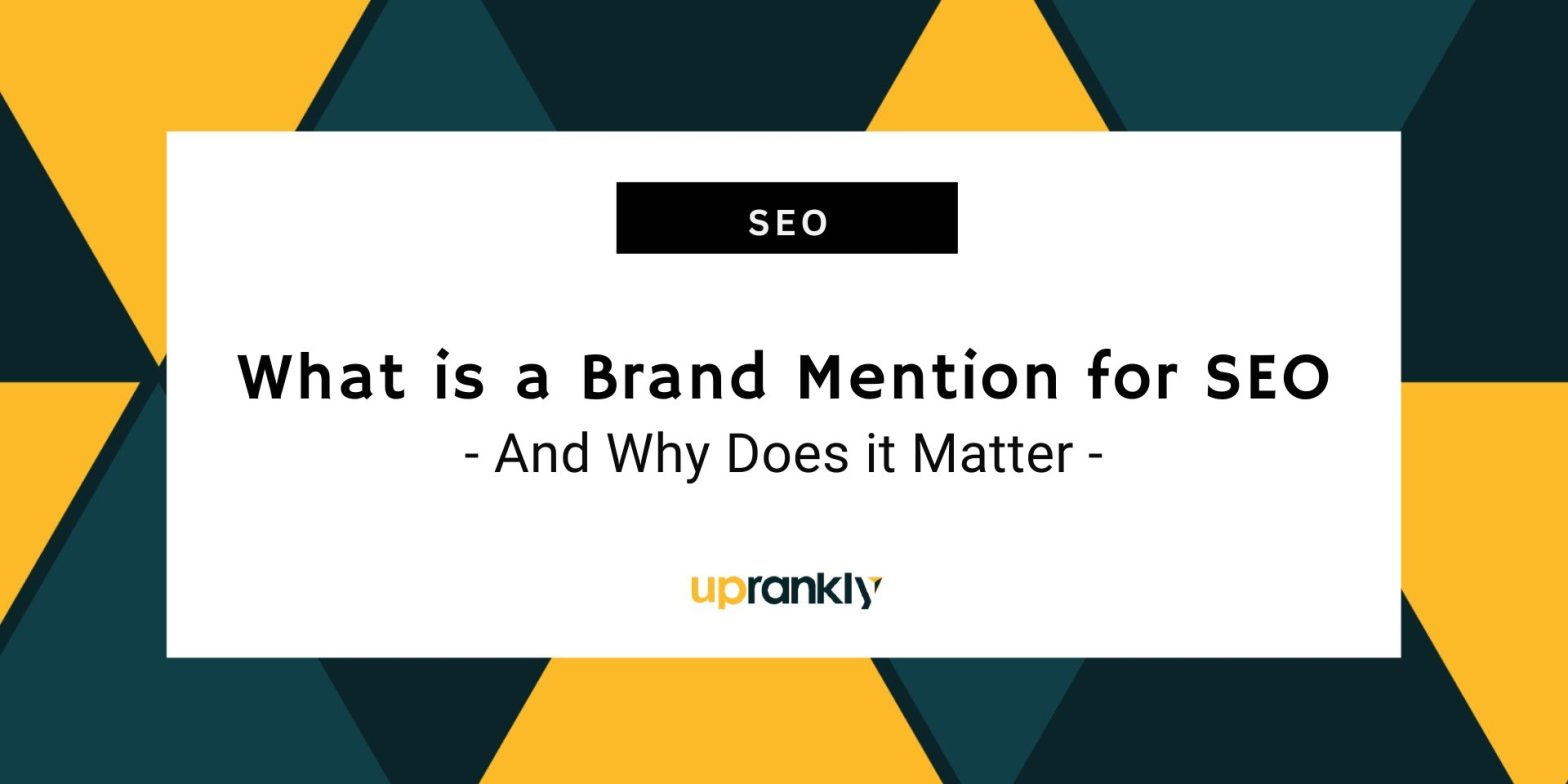A brand mention is any online reference to your business, with or without a link.
Search engines use mentions to understand your authority, topic relevance, and credibility. Frequent mentions in trusted content also help large language models recognize your brand and include you in AI answers.
Key Takeaways
- Brand mentions build trust for Google and AI since LLMs treat them as credibility signals.
- Digital PR, guest posting, and thought leadership help you earn steady, high-quality brand mentions.
- Simple blogger outreach emails can convert unlinked brand mentions into backlinks when authors update content.
In this Uprankly guide, you’ll learn what brand mentions are, why they matter for search visibility and AI models, and the simple steps you can take to earn more of them.
What is a Brand Mention for SEO?
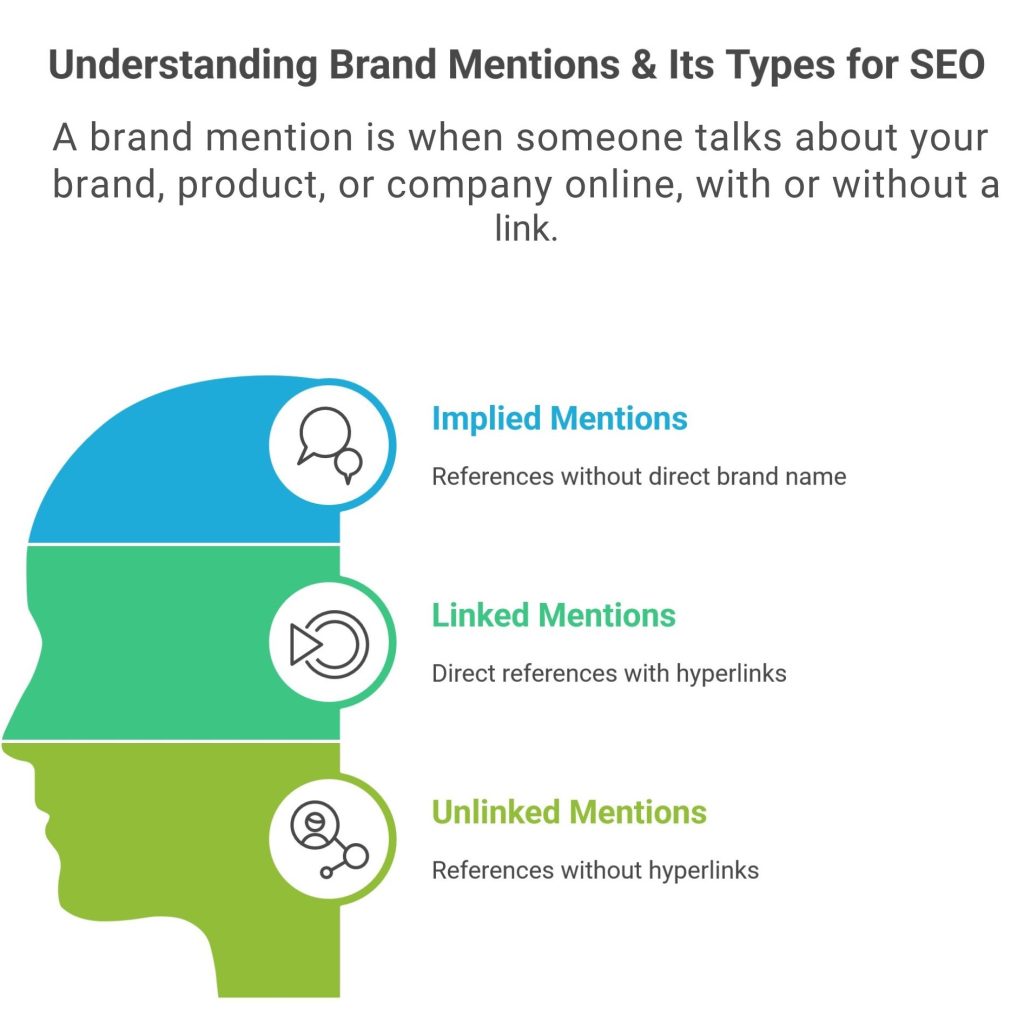
A brand mention is when someone talks about your brand, product, or company online, with or without a link.
It can appear in reviews, social posts, blogs, forums, or even casual conversations. And each mention helps search engines understand who you are and why you matter.
Brand mentions work as brand signals, which help boost brand awareness and shape social proof across the web. Even without a backlink, these mentions help search engines and AI engines trust you more.
Types of Brand Mentions
Implied Mentions
Implied mentions happen when someone talks about your product or service without using your brand name directly. Even without the name, the context still sends strong brand signals, and search engines can connect these clues back to you.
Examples:
- “The tool that automates follow-ups for cold outreach.” (Points to XYZ)
- “A hiring service in Asia that helps find long-term staff.” (Points to ABC)
Why it matters
Implied mentions help build brand awareness in natural conversations and create subtle social proof because people describe your value without being prompted.
Linked Mentions
A linked mention is a direct reference to your brand that includes a hyperlink to your website. It gives search engines a clear signal about who you are and what you offer.
Examples:
- “Learn how XYZ improves email deliverability.”
- “ABC helps companies hire full-time remote staff.”
Why it matters
Linked mentions combine human trust and technical clarity. HubSpot notes that AI engines now care more about the mention than the backlink itself, but the link still reinforces strong brand signals.
Unlinked Mentions
An unlinked mention is a reference to your brand name without a hyperlink attached. These show up in conversations, social posts, comments, and reviews.
Examples:
- “I hired my VA through ABC, and it worked great.”
- “XYZ made my outreach tasks easier.”
Why it matters
Even without a link, these mentions boost brand awareness and work as natural social proof. AI engines scan text across the web, so every unlinked mention helps build your overall brand signals over time.
Where do Brands Usually Get Mentioned Across the Web?

Brand mentions appear across blogs, news sites, social platforms, review sites, forums, and creator content. Search engines read these mentions to learn how people talk about your brand. Strong coverage helps build trust, relevance, and visibility.
Blog Posts
Blog posts often mention your brand in product roundups, tutorials, or casual mentions inside larger articles.
A blogger might talk about using your tool or mention your brand while explaining a process related to Guest Posting or email outreach. Blog content works well because it feels natural and often includes user-generated content that search engines trust.
Small comments inside niche blogs or even a quick mention in a personal story still count as strong brand signals.
News
News sites mention brands in press releases, expert quotes, interviews, or industry roundups. A headline that features your product or a short reference inside a press piece helps build brand awareness fast.
Even a small mention in a story about market trends can help search engines understand what your brand offers and where you fit in your industry. News stories often carry strong credibility, so they support long-term trust.
Social Media Platforms
Social media platforms create some of the most active brand conversations. People post short reviews, reactions, and social content that highlight how they feel about your product.
A simple social media mention like “I love using XYZ for my workflow” adds public proof and helps your brand spread through comments and shares.
Those mentions often spark more discussions in blogs, videos, or forums where Google collects more reliable signals.
Review Sites and Forums
Review sites like Google Reviews, Capterra, G2, and niche comparison platforms give buyers detailed feedback from real users.
Forums such as Reddit, Quora, and industry communities also shape the conversation with unfiltered user-generated content. A mention on a thread like “I tried XYZ for two weeks and it solved my problem” helps build trust because it feels honest and direct.
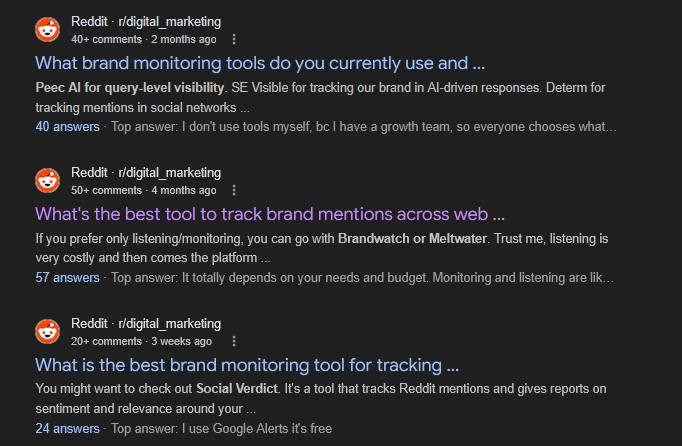
These platforms show search engines what real users think, making the mentions powerful even without links.
Influencer Content
Influencer content appears on YouTube, Instagram, TikTok, and blogs where creators talk about products they enjoy using.
A short shoutout inside a tutorial or a walkthrough can introduce your brand to a broader audience. Influencers often create relatable material that sparks conversations across other social media platforms.
Mentions inside long-form videos or simple captions still build strong social proof, especially when the creator’s audience trusts their opinion.
Podcasts
Podcasts often mention brands during interviews, sponsor messages, or casual conversations between hosts.
A guest might talk about a tool they use or reference your company while explaining their workflow. Podcasts feel personal, so even a short mention can make your brand sound reliable and familiar.
Many listeners search for brands they hear about, which leads to more online conversations and new mentions across blogs and social posts.
Why Does Brand Mention Matter in SEO?
Brand mentions matter because search engines use them to measure trust, authority, and topic relevance. Strong and frequent mentions help your brand gain visibility, support organic rankings, and improve how AI models place you in generated answers.
- Build Trust Signals: Brand mentions show that real people talk about your brand online. Search engines and AI models look at these signals to understand if your brand is trusted and active. A brand that appears in many places feels stronger and more credible.
- Help Search Engines Understand Your Brand; Search engines use brand mentions to learn who you are and what you offer. Mentions give context about your niche and the problems you solve. Google uses these signals to understand the intent around your brand.
- Support Large Language Models: Large language models study public content to learn how people talk about brands. When your brand appears in blog posts, forums, and social conversations, AI models get a clear picture of what you do. More mentions help AI form accurate descriptions of your brand.
- Improve Organic Traffic: More brand mentions often lead to more curiosity. People start searching for your brand name. They also click on articles, reviews, and forum threads that include your brand. These actions increase organic traffic over time.
- Influence AI Overviews: AI Overviews look for trusted sources, popular conversations, and repeated patterns. Frequent brand mentions help you appear in these short answers more often. AI Overviews also check if people speak well of your brand on public sites. A positive pattern signals relevance and authority.
- Boost Brand Visibility Across Platforms: Brand mentions keep your name in front of users across blogs, videos, social media, and review sites. Repeated exposure builds strong brand visibility without relying on ads. Users see your name many times and feel more familiar with your brand.
- Strengthen Social Proof: People trust brands that others talk about. Social proof grows when users share their experience with your product. A review, a short post, or a casual comment can influence many readers. These signals help new users feel safe choosing your brand.
- Help With Entity Recognition: Brand mentions support how search engines recognize your brand as an entity. An entity is a clear and stable identity inside search systems. More mentions give more context clues, which help systems understand your brand name, category, and products.
How do Search Engines Find and Understand Brand Mentions?
Search engines detect and interpret brand mentions by studying how your brand appears in online conversations.
They read language across blogs, news articles, social media, and review sites to understand what people say about you and how often your name shows up.
Every mention creates small clues called entity signals. Search engines use these clues to judge your authority and improve your search visibility across many surfaces, including AI Overviews and semantic search results.
Below are the main technologies and signals involved.
Natural Language Processing
Search engines use natural language processing to understand the meaning of text. NLP helps identify your brand name, the words around it, and the tone of the conversation.
When your brand appears next to industry terms or product categories, NLP connects these ideas. The pattern helps search engines learn what your brand does and which topics you are most relevant for.
Entity Recognition
Entity recognition helps search engines treat your brand as a specific identity rather than a random word.
Your brand mentions are grouped once they appear in news stories, social posts, or review sites. Strong entity recognition makes it easier for search engines to collect data about your brand and show you in structured results, panels, and detailed AI answers.
Mutual Information Signals
Mutual information measures how often your brand appears next to specific topics. A brand mentioned many times alongside the same product category or industry gains more authority in that space.
Search engines treat these patterns as proof of relevance. More positive associations help your brand rise in semantic search because the system understands that users often link your brand to a specific need.
E-E-A-T Evaluation
Brand mentions help build Experience, Expertise, Authoritativeness, and Trustworthiness. Strong mentions from respected sources add clear signals of authority. Positive mentions on Review sites build trust.
Detailed mentions in blogs or industry roundups show experience and expertise. E E A T signals help search engines view your brand as reliable, which supports more substantial rankings and more exposure in AI-driven features.
Knowledge Graph Signals
Search engines use repeated mentions to grow their Knowledge Graph. Each mention adds new information about your brand, such as your industry, product type, audience, or location.
A richer Knowledge Graph profile improves how your brand appears in structured results. Strong Knowledge Graph signals also help AI systems reference your brand more accurately in AI Overviews and large language model responses.
See some of the brand names mentioned in the AI Overview below on the query “what is the best link prospecting tool.”
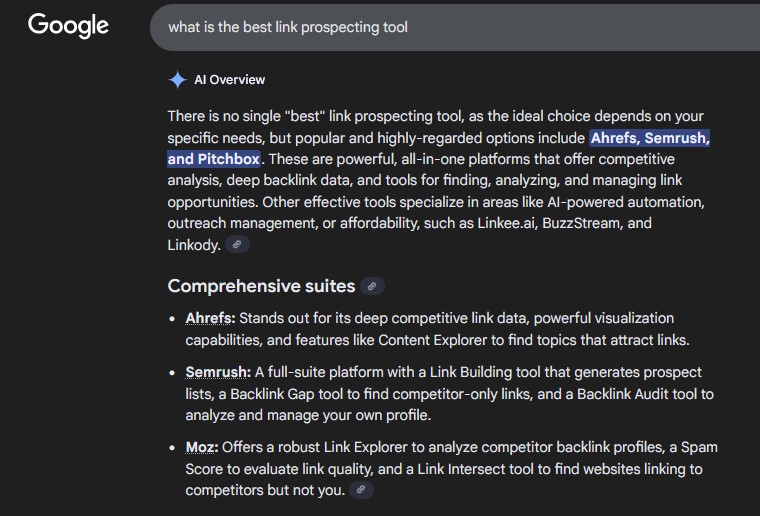
What are the Best Ways to Earn More Brand Mentions?
You can get brand mentions by sharing helpful content, joining active communities, working with creators, and earning reviews. Simple SEO outreach also helps convert unlinked mentions into backlinks. Consistent engagement encourages people to reference your brand naturally.
- Create High Quality Shareable Content: High-quality content builds the foundation for brand mentions. People mention content that helps them solve a real problem.
Check out how Ahrefs, Search Engine Journal gets mentioned along with several other websites in the ChatGPT answer below.

- Publish helpful resources: In-depth guides, case studies, tutorials, and infographics help readers learn fast. Valuable content gets shared often and attracts natural mentions.
- Write guest posts on niche blogs: Guest posts place your brand in front of a new audience. A helpful post often creates natural references to your brand.
- Match content with your expertise: Strong alignment helps your content feel trustworthy. Writers and creators rely on trusted sources when they mention brands in their work.
- Collaborate With Influencers and Creators: Creators spark brand conversations across many platforms. A single mention from a trusted creator can reach thousands of users.
- Partner with creators in your industry: Creators, YouTubers, podcast hosts, and newsletter writers offer clear paths to new mentions. Their audience trusts their voice.
- Share early access and insights: Creators enjoy being the first to share new ideas. Early access helps them talk about your brand in a natural way.
- Focus on micro influencers; Micro influencers have smaller but highly active audiences. Their mentions feel honest and often lead to strong engagement.
- Launch Newsworthy Campaigns and PR Initiatives: PR helps your brand appear in trusted publications. More news coverage leads to strong, high-value mentions.
- Plan events and product launches: Events, awards, and sponsorships help your brand appear in press stories. A single article can create several new mentions.
- Use press releases and media outreach: Press releases help journalists understand your news. Media outreach spreads your story across credible sources.
- Join industry webinars and summits: Webinars and summits bring visibility to your brand. Speakers often mention the brands they work with.
- Encourage Customer Reviews and Testimonials: Reviews help users trust your brand. A strong review pattern also increases the number of mentions on public sites.
- Ask customers to leave reviews: Platforms like G2, Trustpilot, or Yelp allow users to share real experiences. Positive reviews add more brand mentions and increase trust.
- Respond to reviews; Public replies show that your brand listens. Activity in the comment section encourages more discussion.
- Share success stories; A customer story helps others understand your product. Sharing these stories on social channels often inspires new mentions.
- Use Social Media and Community Engagement; Social platforms create fast-moving conversations. A single post can lead to many mentions.
- Run simple social media campaigns: Campaigns or challenges invite users to tag your brand. More tags create more brand conversations.
- Join community groups: Forums, discussion groups, and niche communities offer strong visibility. Helpful input often leads to organic mentions.
- Share posts from people who mention you: A simple reshare encourages more users to join the conversation.
How to Build a Scalable Brand Mention Strategy
A brand mention strategy grows when your content, your creators, and your outreach work together. An effective plan helps your brand show up in more conversations across blogs, news, social media, and communities.
More mentions support search engine optimization, improve organic rankings, and drive steady search growth over time.
Below is a simple, in-depth process you can follow.
Step 1: Align Content, PR, and Social Media
Content, PR, and social media shape the first wave of brand mentions. The goal is to help others mention your brand with ease.
- Share content with creators: Creators often need examples or tools to support their work. Share helpful content with them so they can reference your brand in blogs, roundups, or videos.
- Work with micro-influencers: Micro-influencers have tight communities. Their honest opinion brings natural mentions and adds trust. Many talk about brands they use in everyday work, which makes the mentions feel real and helpful.
- Pitch thought leadership: Podcasts and industry roundups often ask for expert voices. Share your insights with hosts and writers. A single interview can create many mentions across audio, blogs, and social posts.
- Publish share-ready social content:
- Social content that feels simple and useful gets shared more often. More shares bring more social conversations. These conversations create a natural path for new mentions across many platforms.
Step 2: Use Data to Prioritize High-Impact Mentions
Not all mentions help your brand in the same way. Data enables you to focus on the sources that matter most for your audience and your search goals.
- Target sources your audience reads: Many readers trust niche blogs, top creators, or industry newsletters. Mentions from those places help users discover your brand and support better search visibility.
- Find sources with strong performance: SEO tools like Semrush Enterprise AI help you see which sites drive high visibility, positive sentiment, and strong search growth. These sources should be a priority.
- Focus on high-value publications: Several blogs hold steady traffic for keywords in your niche. A mention on those sites can influence organic rankings and support your long-term search engine optimization plan.
Step 3: Strengthen Your Entity Signals
Strong entity signals help search engines understand your brand with clarity. Clear signals help your brand show up in semantic search and improve your overall visibility.
- Stay inside your topic lane: Brands grow authority when they appear in the same topical space many times. A clear pattern tells search engines what you do and who you help.
- Avoid random or off-topic mentions; Mentions in unrelated spaces confuse search engines. Confusion weakens authority and slows growth.
- Build a focused pattern: A steady pattern of mentions around your core product and niche creates strong recognition inside search systems. Clear signals support your visibility in AI results and organic rankings.
Step 4: Build Relationships for Long-Term Success
Relationships help your brand grow beyond one-time mentions.
- Connect with writers and creators; Writers and creators often return to brands that support them. A kind message or simple thank-you creates a healthy loop of ongoing mentions.
- Engage with communities: Communities appreciate genuine input. Share helpful ideas, answer questions, and support discussions. These actions often lead to natural brand mentions from community members.
- Use warm outreach for unlinked mentions: Some writers mention your brand without linking. A friendly message asking for a link can strengthen your SEO. Many authors update their published posts when asked politely.
Step 5: Automate and Scale Outreach
A growing brand needs consistent outreach. Link building automation tools can help you scale your outreach efforts without losing quality.
- Use repeatable outreach workflows; Simple templates help your team reach out faster. Repeatable messages save time and help keep your voice consistent.
- Schedule outreach at the right time: Writers often check emails on Tuesday or Wednesday mornings. Good timing increases your reply rates and helps you grow faster.
- Mix automation with human effort; Automation helps you scale, but relationships need a human touch. A balanced mix creates healthy growth without losing authenticity.
Step 6: Maintain a Consistent Presence
A good brand mention strategy works quietly in the background. The goal is to create steady movement, not short spikes.
- Keep showing up: A consistent presence brings more trust. People see your brand in many places, which builds recognition and confidence.
- Let momentum grow: Frequent mentions help your brand appear more often in conversations, blogs, and social posts. More mentions improve search visibility and build authority.
- Support long-term SEO gains; A strong mention pattern reinforces your authority and relevance in search engines. The growth leads to more organic rankings and stronger search engine optimization results.
How to Find, Track, and Analyze Brand Mentions
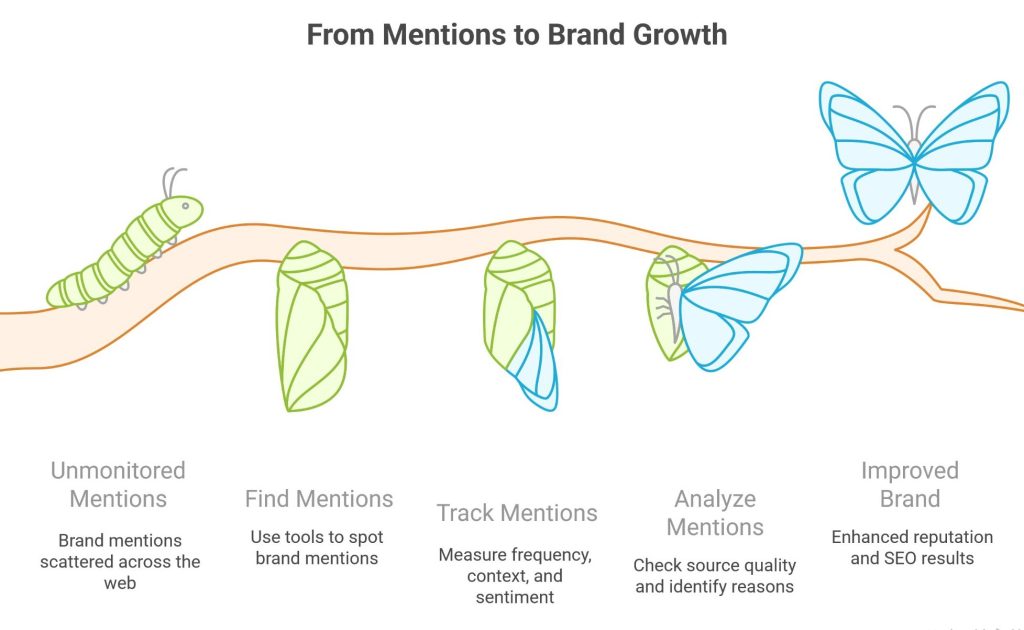
Finding, tracking, and analyzing brand mentions helps you understand how people see your brand online. A clear process also shows how mentions shape your reputation and your SEO results. Here is a simple way to handle each step.
How to Find Brand Mentions
Finding brand mentions starts with strong monitoring. The goal is to see every new mention across the web.
- Use brand monitoring tools: Monitoring tools like Semrush, Ahrefs, Brand24, and Google Alerts help you spot mentions in real time. Each alert shows where your name appears and how people use it in their content.
- Check more than one website: Mentions appear on social platforms, forums, community sites, podcasts, and even broadcast transcripts. A wide search helps you spot hidden mentions that do not show up in simple searches.
- Track related topics; Many people mention your brand without using your name. Monitoring your core topics helps you find indirect or implied mentions. These mentions influence how search engines understand your niche authority.
How to Track Brand Mentions
You can track brand mentions by measuring frequency, sentiment, source quality, and overall visibility. A clear set of metrics shows your progress.
- Measure Share of Voice and visibility: Brand Share of Voice shows how much of the overall conversation you own in your category. Visibility rankings show where your brand appears in search. Both metrics help you judge your growth.
- Track frequency and context; Look at how often your brand appears and where it appears. A steady pattern of mentions shows strong momentum. Context also matters because it shows why people talk about you.
- Use sentiment analysis: Sentiment tools label mentions as positive, neutral, or negative. Positive mentions help your brand grow. Negative mentions show areas that need attention. Sentiment helps you set priorities fast.
How to Analyze Brand Mentions
Analyze brand mentions by reviewing sentiment, source quality, context, frequency, and SEO impact.
Analysis gives you meaning behind the data. Strong analysis helps you improve both your brand strategy and your SEO results.
- Check source quality and reach: Some sources carry more influence than others. News sites, respected blogs, and niche communities bring stronger signals. A mention on a trusted site can shape your reputation more than many small mentions.
- Identify the reason behind the mention: People mention brands for different reasons. Some mention features, price, while others mention quality. Understanding the reason helps you shape future content and marketing.
- Connect mentions with SEO results: Brand mentions influence rankings, featured snippets, branded searches, and AI-driven results. A rise in mentions often leads to higher visibility across search. Connecting the two helps you understand what drives your growth.
- Use insights to improve your brand: Insights help you fix issues and highlight strengths. A quick response to negative sentiment protects your reputation. Clear patterns also help you guide new content and improve your brand story.
FAQ
Are brand mentions a direct link factor?
Brand mentions are not a direct link factor, but they support trust, relevance, and entity signals. Strong mention patterns help search engines understand your brand and boost your overall visibility.
Can I turn brand mentions into backlinks?
You can turn brand mentions into backlinks by asking authors to add a link to your site. A polite, warm message works well and often leads to a quick update.
Are brand mentions and reputation management the same?
Brand mentions are references to your brand across the web, while reputation management focuses on shaping how people feel about you. Both support trust, but they serve different roles.
What is the importance of brand mentions on ChatGPT?
Brand mentions on ChatGPT help large language models understand your brand, link you with key topics, and include you in AI answers.
Sum Up
What is a Brand Mention for SEO? It is more than a simple concept. It is a sign of where search is heading. Search engines are now paying attention to the conversations around your brand. They look at how people talk about you, where your name appears, and how often it shows up in trusted spaces.
Google’s AI Overviews, ChatGPT/Claude/Perplexity results, and many new AI surfaces rely on signals that go far beyond links. Mentions help large language models read the web and understand which brands deserve attention. Strong mention patterns can support your authority in a natural way.
Backlinks still matter, and they always will. The two work together. Mentions make your brand familiar. Backlinks help your pages rank. Mentions then strengthen the ranking with clear trust and relevance. Both signals support each other to build long-term visibility.
If you want to explore how these two signals compare, you can read our guide on backlink vs brand mentions, where you will learn how each one shapes your overall SEO strength.
